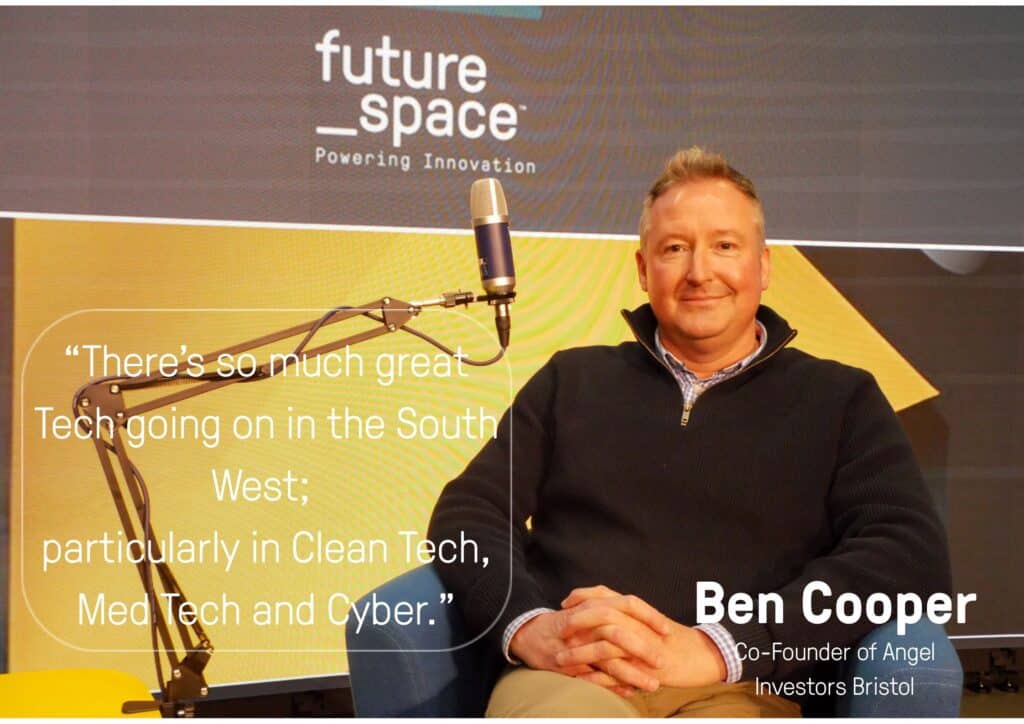In this month’s Trailblazer Spotlight, our new feature on innovation insights, we’re taking a deep dive into the evolving investment landscape for tech startups in the South West. To guide us through this complex terrain, we spoke with Ben Cooper, co-founder of Angel Investors Bristol. With nearly 140 members and a growing portfolio of early-stage investments, Ben is uniquely placed to share insights from the frontlines.
This blog post captures the highlights of our conversation with Ben, aimed at tech founders, academic spin-outs, plus those entrepreneurs navigating the funding landscape across both the university and innovation sectors.

Introducing Ben Cooper: From Finance to Founding AIB
Ben’s journey into the world of angel investing spans over two decades in financial services. “I started in finance management, launched a tech fund right before the dot-com crash – lessons learned the hard way,” he recalls. After selling his last business to St. James’s Place in 2016, Ben shifted focus to investing in startups, mentoring founders, and helping build innovation ecosystems.
Today, Ben wears many hats. In addition to Angel Investors Bristol (AIB), he is also a director at Tech South West, supporting regional clusters across the region – from Cornwall to Exeter and beyond. “It all connects in a kind of method-in-the-madness way,” he says.
The State of Play: Tough but Active
When asked about the current state of investment in the South West tech scene, Ben doesn’t sugarcoat it. “It’s a tough environment,” he says. “Nationally, investment in private companies was down around 12% last year. In the South West, it was down 30%.”
But it’s not all doom and gloom. “What’s interesting is that deal flow hasn’t stopped. We’re still seeing 30 to 40 investment applications a month,” Ben explains. The demand is strong – but what has shifted is the nature of the deals. “We’re seeing later-stage businesses approach angel investors because traditional VCs are sitting on their hands.”
This trend is squeezing out early-stage startups who haven’t yet reached traction, particularly those at the MVP or pre-revenue stage – ironically, the very companies angel networks were designed to support.
Bridging the Gap: Where Early-Stage Companies Are Struggling
Why the change? Ben links it to broader market liquidity issues. “There’s less money being recycled into the ecosystem. Fewer IPOs, fewer acquisitions – those are the events that release capital.” Without that liquidity, early-stage companies find it harder to raise.
Compounding the problem, Ben says, is the “missing middle” of investment. “There’s a lot of money for idea-stage projects, especially from Research Councils and grants. There’s also support for companies with traction. But that commercialisation gap – that pre-seed to seed bridge – is where things fall apart.”
This is especially true for hardware and medtech companies, where regulatory and development hurdles increase capital requirements and investor caution.
Southwest Strengths: Clean Tech, Med Tech, Cyber and More
Despite the challenges, Ben remains bullish on the South West’s innovation potential. “Look at the government’s priority areas – defense, energy security, green tech – and we’re strong across all of them,” he says.
Tech hubs like Future Space in Bristol, amongst countless others, are fostering innovation across clean energy, medtech, and cyber security. Ben points to startups working in tidal and offshore wind, preventative healthcare, and advanced AI applications. “There’s so much happening here – it just needs more visibility and support.”
Signs of growing interest are emerging. “VCs are starting to open regional offices. They’re realising innovation doesn’t only happen in London or the Southeast,” Ben adds. Foresight and other fund managers establishing local presences is a promising signal.
Keeping Talent Local: The Retention Dilemma
While attracting talent to the region has improved – thanks in part to remote work – retaining growing companies is still a challenge. “Startups are often encouraged to scale where the funding is,” Ben says. “That often means relocating to London or abroad.”
International investors, including Canadian pension funds and US-based VCs, are increasingly acquiring UK startups and pulling them into their home markets. “It’s frustrating,” Ben adds. “We’re building incredible companies, only to see them leave.”
His vision? Place-based investment that provides local capital, infrastructure, and support ecosystems so that companies can scale where they started. “It’s not just about funding. It’s about building communities around these businesses.”
Skills Gap: Bridging Commercial and Operational Expertise
Ben highlights a persistent gap in commercial and operational know-how. “Founders -especially from academia – are brilliant at invention but may lack the experience to scale a company,” he says.
He advocates for early self-awareness and team building. “The ideal founder recognises when they need to bring in others. That might be a co-founder with commercial experience, or a coach who helps shift from R&D to operations.”
This is where universities and colleges can help. “There’s a big opportunity to work with traditional industries, retrain talent, and bridge that operational gap.”
University Spin-Outs: Is It Getting Better?
The fraught relationship between investors and university spin-outs has long been a sticking point – particularly around IP ownership. Has it improved?
“A bit,” Ben says. “Some universities are better than others. The key is understanding that a startup has to be investable. Holding onto too much IP can kill deals.”
He emphasises that it’s better for a university to have a smaller stake in a successful company than a large stake in one that never reaches market. “Ultimately, if your research is out there solving real problems, it validates all the funding and support that went into it.”
AI’s Impact on Investment Itself
Interestingly, AI isn’t just disrupting sectors – it’s also changing how investment decisions are made.
“There are now AI tools that analyse pitch decks, assess market fit, and scan for red flags,” Ben notes. “The upside is speed and efficiency. The downside is we risk getting homogenised decks that are ‘optimised’ for machines, not people.”
AI is helping sift through more data faster, which could mean more rejections earlier in the process – but also better investment decisions. “It’s a double-edged sword. It’ll be interesting to see how it plays out.”
Final Word: What Startups Should Know Before Raising
Ben ends with practical advice for early-stage founders seeking investment.
“At the early stage, you won’t have much – no revenue, maybe not even a product. What you do have to show is the size of the opportunity and your ability to go after it.”
He says the two things investors look for are:
- Is this a big, compelling opportunity?
- Is this the right team to chase it down, even if the plan changes?
“Everything else – tech, market assumptions, even the product – can shift. But if you’ve got a strong team and a real opportunity, you’ve got a shot.”
Takeaway for Tech Founders and Universities
The South West has the talent, the ideas, and the environment. But to truly capitalise on its innovation potential, we need targeted, place-based investment, stronger commercialisation pathways, and a more inclusive view of what it takes to grow great businesses.
As Ben Cooper reminds us, “The tech is often there. The opportunity is massive. Now it’s about building the ecosystem that helps it stick.”
